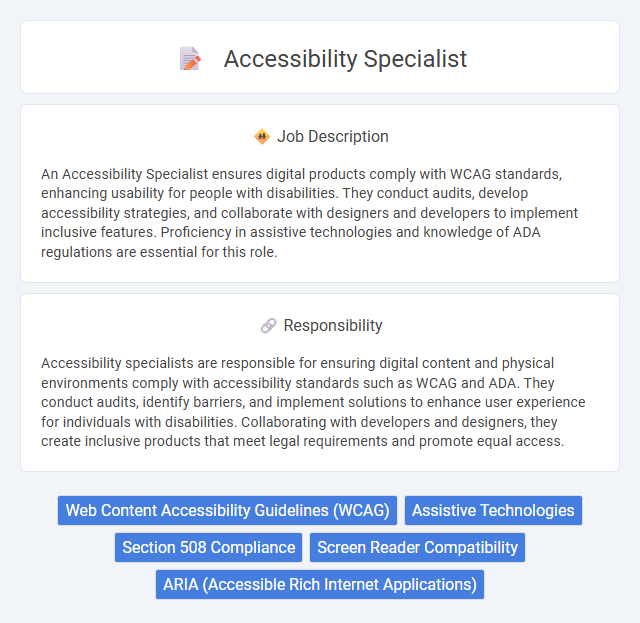
An Accessibility Specialist ensures digital products comply with WCAG standards, enhancing usability for people with disabilities. They conduct audits, develop accessibility strategies, and collaborate with designers and developers to implement inclusive features. Proficiency in assistive technologies and knowledge of ADA regulations are essential for this role.
People with a strong attention to detail and a passion for inclusive design are likely well-suited for an Accessibility Specialist role, as the job involves ensuring digital content is usable by individuals with disabilities. Those with experience or empathy towards diverse conditions such as visual, auditory, cognitive, or motor impairments may find this career fulfilling and aligned with their skills. Individuals who thrive in collaborative environments and are patient problem-solvers probably have a higher probability of succeeding in this specialized position.
Qualification
An Accessibility Specialist requires expertise in web accessibility standards such as WCAG 2.1 and proficiency with assistive technologies like screen readers and voice recognition software. Strong knowledge of HTML, CSS, JavaScript, and accessibility testing tools is essential for conducting audits and implementing solutions. Certifications such as Certified Professional in Accessibility Core Competencies (CPACC) or IAAP certification enhance qualifications and demonstrate industry-recognized skills.
Responsibility
Accessibility specialists are responsible for ensuring digital content and physical environments comply with accessibility standards such as WCAG and ADA. They conduct audits, identify barriers, and implement solutions to enhance user experience for individuals with disabilities. Collaborating with developers and designers, they create inclusive products that meet legal requirements and promote equal access.
Benefit
Hiring an accessibility specialist likely improves website and product usability for people with disabilities, potentially expanding customer reach and enhancing brand reputation. Their expertise in compliance with accessibility standards such as WCAG reduces the risk of legal challenges and associated costs. Organizations may also experience increased employee productivity and satisfaction as inclusive design practices foster better overall user experiences.
Challenge
Accessibility specialists likely face challenges in staying updated with evolving regulations and technology standards, requiring continuous learning and adaptation. They probably need to balance technical constraints with user needs to create inclusive digital experiences. Ensuring compatibility across diverse devices and platforms may present ongoing difficulties in their work.
Career Advancement
An Accessibility Specialist plays a crucial role in ensuring digital and physical environments comply with accessibility standards, enhancing user experience for individuals with disabilities. Career advancement opportunities include roles such as Accessibility Consultant, UX Designer specializing in inclusive design, or Chief Accessibility Officer, often requiring expertise in WCAG guidelines, assistive technologies, and legal compliance such as ADA and Section 508. Continuous professional development through certifications like IAAP's Certified Professional in Accessibility Core Competencies (CPACC) can significantly boost career growth and salary potential within this field.
Key Terms
Web Content Accessibility Guidelines (WCAG)
An Accessibility Specialist ensures digital content complies with Web Content Accessibility Guidelines (WCAG) by evaluating websites for compatibility with screen readers, keyboard navigation, and other assistive technologies. They conduct audits, create remediation plans, and train development teams to implement WCAG 2.1 and WCAG 3.0 standards, improving usability for users with disabilities. Expertise in HTML, ARIA roles, color contrast ratios, and semantic markup is critical for maintaining accessibility and legal compliance.
Assistive Technologies
Accessibility specialists focus on implementing and optimizing assistive technologies such as screen readers, voice recognition software, and alternative input devices to enhance digital accessibility. They conduct thorough audits to ensure compliance with standards like WCAG and Section 508, improving user experience for individuals with disabilities. Expertise in tools like JAWS, NVDA, and Dragon NaturallySpeaking is essential for tailoring solutions that address diverse accessibility needs.
Section 508 Compliance
An Accessibility Specialist ensures digital content and technology comply with Section 508 standards, enabling access for individuals with disabilities in federal agencies and contractors. They conduct audits, provide remediation guidance, and implement accessible design principles to meet WCAG and Section 508 requirements. Expertise in assistive technologies, HTML, ARIA, and ADA regulations is essential for effective accessibility compliance management.
Screen Reader Compatibility
An accessibility specialist ensures digital content is fully compatible with screen readers like JAWS, NVDA, and VoiceOver, enhancing usability for visually impaired users. They conduct rigorous testing and remediation of websites and applications to meet WCAG standards, improving navigation and content clarity through ARIA attributes and semantic HTML. Mastery in accessibility tools and user experience principles drives inclusive design, enabling equal access to information and services.
ARIA (Accessible Rich Internet Applications)
Accessibility specialists leverage ARIA (Accessible Rich Internet Applications) to enhance web content for users with disabilities by implementing specific roles, states, and properties that communicate dynamic content changes to assistive technologies. Proficient application of ARIA landmarks and attributes ensures improved navigation and interaction for screen reader users, making complex web interfaces more accessible. Mastery of ARIA guidelines is critical for compliance with WCAG (Web Content Accessibility Guidelines) and for creating inclusive, user-friendly digital experiences.
 kuljobs.com
kuljobs.com